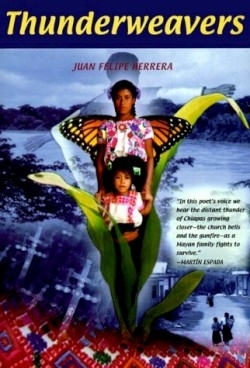Thunderweavers/ Tejedoras de rayos (Camino Del Sol)
Six years ago on New Year’s Day, the Zapatista Army of National Liberation stepped into the main square of a small city in Chiapas, Mexico, and made a huge imprint on the international consciousness of human rights. The common soldier was the Mayan peasant, and it is testament to the isolation of the peasantry that during the two decades of clandestine Zapatista organization, not a whisper escaped to the press, government or intelligentsia.
Herrera’s long, passionate poem concerns a massacre and the diaspora that took place in the tiny village of Acteal a few days before Christmas, 1997. A young girl asks a question and calls out to her mother with the images of war, the tribes and the Highlands of Chiapas: “Gardens and tombs of mineral and vengeance cornfields and corpses, women with red ribbons.”
The mother is dead, but her spirit pleads with the girl to go to the bishop, to organize and to not forget her parents. The poem speaks with four voices and the next is that of the grandmother:
All I hear are the bells
I can sense each stripped flower, each crime
of backs crossed with bullets
each boy as if my own
each girl as if my own
each shredded young squash plant, in the dead puddle
I can hear the bells and so many heavy rivers
tumbling down from the Highlands.
Thunderweavers is titled after the name the women give themselves. Mayan women are renowned for their intricate brocade textiles, as well as the cosmology they have preserved in the weavings.
Thunder, snakes and toads are all players in the spiritual world of the Maya. Herrera describes a new cosmology of destruction and change. In the final section, Makal, pregnant Daughter of the Drums, sings: “Totil Me’il / I finished my weavings / in the manner taught to us by the saints./ I fulfilled my obligations / I am walking down the broken path, dreams / mirror of ashes, black corn wing.”
Herrera is the author of many books of poetry and, here, he has done a commendable job of bringing the horror of this time to poetry. The work has immediacy and momentum as well as continuity, and there is a clear feeling of resolve at the end when all the threads of his tapestry come together.
The massacre at Acteal has also been resolved to a certain degree. The mayor of a neighboring village was arrested in 1998 and sentenced to thirty-five years of prison for organizing the deed. He was apparently avenging the death of a son. The politics of Chiapas, however, are far from clear.
Faction fights faction and paramilitary groups breed in the standoff between the Zapatistas and the Mexican government. The bells of Chiapas will be ringing again, soon. (March)
H. Shaw Cauchy
Reviewed by
H. Shaw Cauchy
Disclosure: This article is not an endorsement, but a review. The publisher of this book provided free copies of the book to have their book reviewed by a professional reviewer. No fee was paid by the publisher for this review. Foreword Reviews only recommends books that we love. Foreword Magazine, Inc. is disclosing this in accordance with the Federal Trade Commission’s 16 CFR, Part 255.

